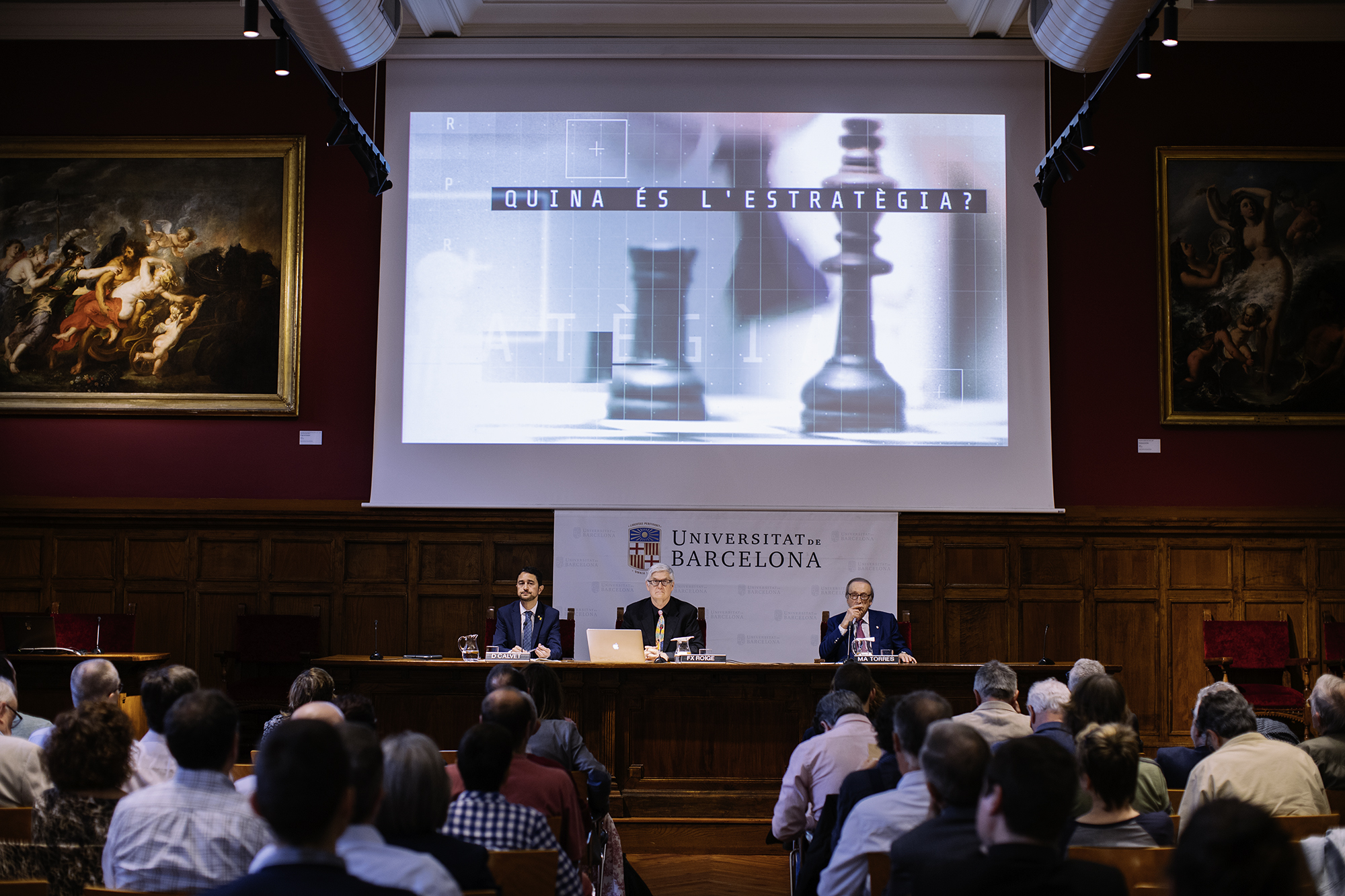The experts meeting this Wednesday, 5 June, at the 8th Environment Conference organized by the University of Barcelona, Familia Torres and the meteorologist and UB lecturer Tomàs Molina, agreed that a carbon tax is an effective solution to decarbonize the economy and halt global warming. They also urged governments to act immediately, as there can be no excuses in the current climate emergency.
These were the main conclusions of the event held in Barcelona in the historic UB building, under the slogan “Are taxes the solution to climate change?”. More than a dozen experts from Spain and abroad took part and around 200 people attended. The conference was opened by the Minister for Regional Planning and Sustainability of the Government of Catalonia, Damià Calvet, the President of Familia Torres Miguel A. Torres, and the vice-rector responsible for doctorates and promoting research at the UB, Francesc Xavier Roigé, who defined climate change as “the greatest challenge in our history”.
Miguel A. Torres noted that “politicians need to be aware of the extreme seriousness of climate change” and he criticized the fact that there are currently more subsidies for oil than for renewable energies. “This is everyone’s problem and we must all do something to decarbonize the economy,” he said.
Damià Calvet advocated carbon taxes, despite the difficulties they are encountering. “We need to collect taxes as efficiently as possible to give the right signals, and invest in low-carbon energy,” he said. Calvet highlighted the declaration of a climate emergency promoted by the Government of Catalonia, which showed its concern on this issue. “This must increase our awareness and we need to review the tools we have available more quickly,” said Calvet.
Maite Vilalta, vice-rector responsible for equality and social action at the UB, focused on the taxation issue from an academic point of view. She saw climate taxes as “mechanisms for penalizing or punishing assets with negative externalities.” “They are behaviour-correcting taxes; the aim is not to collect revenue,” she said, warning that this type of tax is costly to manage and administer, and that governments also have other instruments to regulate the market.
Jeroen Van den Berg, research professor at ICREA at the ICTA-UAB and professor of environmental economics at the Free University of Amsterdam, said there was fear and resistance from governments, which were reluctant to implement measures that might negatively affect business competitiveness. He said the climate emergency would not be resolved without a harmonized policy involving all countries and including carbon taxes. Emilio de las Heras, expert in international finance and author of the blog Cambio Climático y Economía (Climate Change and Economics) for the Expansión newspaper, said that “Spain needs an ambitious climate tax law” taxing carbon progressively, which would be internalized and implemented forever.
Gemma Barricarte, spokesperson for Fridays for Future Barcelona, lamented the failure of governments and citizens to act to halt the climate disaster. “The continuity of life on the planet as we know it is on the edge of the abyss,” she said, pointing out that reducing emissions is the only possible way “of ensuring we have a future.”
Dave Sawyer, chief economist at the Canadian Climate and Clean Growth Institute, set out the case of Canada as an example of a carbon tax, stressing the coordination between the federal and provincial governments to establish targets and policies appropriate for the needs of each area. According to Sawyer, the amount of tax is established depending on the amount of carbon in fossil fuels. The tax is paid by distributors and affects consumers, but they receive a rebate from the government to help pay their energy bills. The economist pointed out that these measures would be more affordable if they were implemented globally, aligning costs and achieving coordinated climate regulation.
The journalist Josep Cabayol, the moderator of the round table, approached the climate emergency from a human point of view: “According to the World Health Organization, 800,000 people in Europe suffer premature deaths due to poor air conditions.” He expressed his doubts about resolving the climate emergency under the current capitalist system. Javier Martin-Vide, professor of Physical Geography at the UB, reviewed the effects of climate change using real examples, such as the fact that olive trees are now flowering 19 days earlier than they did last century. Enric Tello, professor of History and Economic Institutions at the UB, focused on the congruence of the message put across by the media and the market. “We need to make all dimensions of the message congruent,” he said. Aida Vila, Project Manager for Integrity at Greenpeace International, argued that part of the problem is the system, which means that the search for happiness is associated with personal and collective growth. “We live in a system that disconnects us from the environment,” she said. Vila reminded citizens that they have the power to vote for politicians who pledge to act.
Laura Rahola, press officer of the European Commission office in Barcelona, set out the conclusions of the day: “We have the tools and the studies necessary for our governments to take coordinated actions with a carbon tax involving the return of the revenues collected to citizens, as the price increase could be the solution that changes consumption habits.” According to Rahola, experts could end the reticence of governments by showing them that the solution is feasible in terms of figures. The meteorologist Albert Barniol, presenter of the conference, concluded the event, pointing out that the media had a duty to give information about the problem.
6th Torres & Earth Award for Environmental Innovation
As part of the Environment Conference, the 6th Torres & Earth Award for Environmental Innovation was presented for the study “Potabilización del agua y gestión de los residuos de Madina Souane” (Drinking water Purification and Waste Management at Madina Souane) carried out by the UB environmental science students David Asensio, Gemma Bargalló, Lucia Blanc and Mar Pradell.
The aim of this award is to publicize and reward projects, experiments and initiatives from students and scientific groups promoting the preservation of the environment. This year there were eight entries, which were on display at the conference and were voted on by those attending and by the Environment Conference scientific committee.



